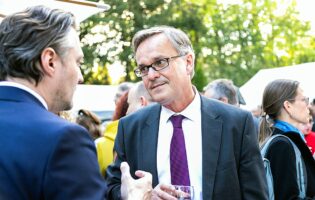Working Against Mental Shortcuts: Learning to Value Different and Complex World Views

Christine Mähler
ConAct – Coordination Center German-Israeli Youth Exchange
Christine Mähler is the Director of ConAct – Coordination Center German-Israeli Youth Exchange, an institution that is funding, advising, qualifying, and expanding the national youth exchange program between Germany and Israel. The office is commissioned and authorized by the German Federal Ministry of Family Affairs, Senior Citizens, Women and Youth. The national exchange program annually includes 300 encounter projects with 7000 youngsters and professionals of nonformal education, which are being put into practice within partnerships between youth movements and NGO’s from Germany and Israel. Christine Mähler is a psychologist and mediator. She has done qualitative research on the impact of the Holocaust on members of the second generation of Jewish Holocaust Survivors in Germany and Israel. Before founding ConAct she was an educational coordinator at the NGO Action Reconciliation Service for Peace, responsible for the volunteer program in Israel Germany. She also worked for an NGO building an international youth encounter at the former concentration camp site of Sachsenhausen. Christine Mähler has been involved in German-Israeli encounters for thirty years. For quite a number of years she was chairwomen of the German-Israeli Young Forum and member of the executive board of the German-Israeli Friendship Association. She lived and studied in Israel for two years.
She is a 2016-2017 participant in AICGS’ project “A German-American Dialogue of the Next Generation: Global Responsibility, Joint Engagement,” sponsored by the Transatlantik-Programm der Bundesrepublik Deutschland aus Mitteln des European Recovery Program (ERP) des Bundesministeriums für Wirtschaft und Energie (BMWi).
“This is how the Americans truly are…” is a sentence we keep hearing in Germany these days. We keep trying to summarize people from or living in certain countries as one homogeneous group—“The Polish,” “The Russians,” or “The Israelis.” We think that they look, think, and behave in certain ways even as we usually dislike being viewed as “The Germans.” And right now, we are hearing and reading a lot about “The Americans.”
Yes, it is true: We all live in a world consisting of certain pictures, viewpoints, and estimations about the people around us—about their appearance, sayings, and actions. We have worked hard to create our own personal world view and within this process we have no alternative but to take “mental shortcuts,” connecting certain characteristics with one another and thereby developing implicit personality theories about ourselves and about others as members of certain groups. But as soon as we connect them to positive or negative qualities or feelings, we hold certain stereotypes. And these not only reduce the vast diversity of the existing reality, they also mobilize misunderstandings, disrespect, and depreciation. How can we question these stereotypes?
In times of rising popular populism in Europe and around the world, the easy world views of “black” and “white,” of “good” and “bad,” receive growing interest. It seems much easier to identify with seemingly clear views and judgments instead of facing a whole variety of pros and cons, of diversity in individual experiences, viewpoints, opinions, histories, and identities. It is harder to question simplified pictures of seemingly collective groups. But those who try to force us into staying with or returning to the reduced stereotypes of “The Women,” “The Homosexuals,” “The Refugees,” and other virtually created groups will not succeed. The existing democratic civil societies are strong, and the culture of discussion, consideration, and openness is spread far and wide. But now this culture needs to be fostered even more!
It has often been stated that in times of crisis that seem to threaten democratic cultures, even political leaders count on the impact of civil societies, and especially on structures of cooperation that exist across national borders. It is exactly these bonds of uncountable connections between NGOs and acting individuals focusing on education, science, sports, culture, youth, ecology, and human rights that have created lasting bonds through the last six decades—and helped them grow between the U.S. and Germany. It is these processes of hesitating, negotiating, and finally agreeing on shared aims and values that help us to question “generalizing mental short cuts” on the professional level. And it is these frames of education and encounter, of getting to know, of coming in touch with, of gaining insight, of winning new perspectives, of taking chances on closeness that help naturally build differentiated and complex pictures of others. One of the best outcomes of this educational process is the oft-quoted and simple statement: “The most surprising thing was to see how they are not so different from us…”








